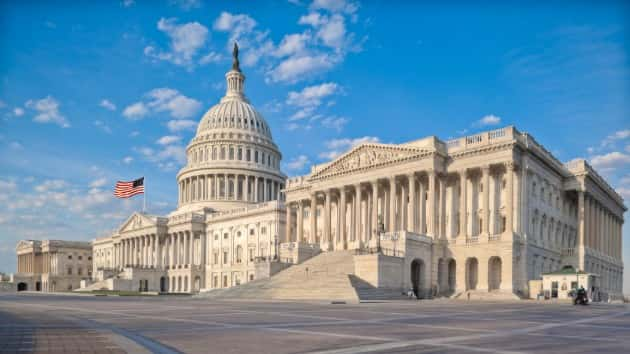
drnadig/iStock
 drnadig/iStock(WASHINGTON) — The House Rules Committee is set to hold the first congressional hearing on Medicare-for-all legislation on Tuesday, as the progressive pitch to reshape American health care dominates policy discussions in the 2020 Democratic presidential primary.
drnadig/iStock(WASHINGTON) — The House Rules Committee is set to hold the first congressional hearing on Medicare-for-all legislation on Tuesday, as the progressive pitch to reshape American health care dominates policy discussions in the 2020 Democratic presidential primary.
Specifically, the hearing will focus on legislation from Reps. Pramila Jayapal, D-Wash., and Debbie Dingell, D-Mich., which has been co-sponsored by more than 100 Democrats and builds on ideas promoted most prominently by presidential candidate Sen. Bernie Sanders.
“We want a full debate. This will be a full hearing, a full debate, televised, and [will] bring momentum,” Jayapal told ABC News on Monday.
The House Democrats’ proposal would not require patients to pay for any expenses and would include primary, hospital, dental, vision and maternity care. It would cover prescription drug costs and allow the government to negotiate drug prices directly with manufacturers.
The bill, which does not include a funding mechanism, also would preserve health care and medical benefits from the Veterans Administration and Indian Health Service, and give consumers two years to phase in to the program.
Sanders’ latest proposal for a single, national health insurance program would give Americans four years to join, instead of two, and handles some long-term care differently. It would also allow for co-pays for prescription drugs capped at $200 annually.
Democrats and Republicans have invited a handful of health care experts and academics to testify this week.
On Friday, Democrats added Ady Barkan, a prominent progressive activist and single-payer advocate who suffers from amyotrophic lateral sclerosis, or ALS. Because of the disease, Barkan, who is wheelchair bound, will deliver his testimony using a system that converts his eye movements into speech.
After Democrats’ successful midterm campaigns zeroed in on preexisting conditions coverage, Republicans on Capitol Hill have seized on the other party’s health care debate ahead of 2020, using procedural votes and committee meetings to highlight questions about Medicare for all’s cost and potential impact on private health insurance.
“Patients and families want more choice and control over their doctors, treatments and coverage. They want lower costs and greater access to care. But government run, one-size-fits-all health care is not the answer,” Rep. Greg Walden, R-Ore., the top Republican on the House Energy and Commerce Committee, said in a statement to ABC News. “The Democrat plan is socialism. Under their plan, Americans will have fewer choices, taxes would skyrocket, and access to care would slow to a crawl.”
In February, Walden requested a Medicare-for-All hearing in the Energy and Commerce Committee, in an effort to highlight questions about the cost of the proposal.
The Mercatus Center at George Mason University estimated last year that Sanders’ plan would cost more than $32 trillion over 10 years. Sanders has argued that the federal government is already spending significant sums on health care and could redirect some current spending to the new program, in addition to raising taxes on “extreme wealth.”
Democratic leaders said Tuesday’s hearing will be the first of several in the House on Medicare-for-all legislation. The House Budget Committee will hold a hearing in May on a forthcoming analysis from the nonpartisan Congressional Budget Office of single-payer health care, according to a spokesperson.
The tax-writing Ways and Means Committee, along with the Energy and Commerce Committee, with its jurisdiction over health policy, could also take up the topic later this year.
“The fact that it’s not in the ultimate, top committee that you might have to go to, is just one piece of it,” said Jayapal, who pointed out that she negotiated to hold the first hearing in the Rules Committee. “We want to talk about this and get the ideas out, and have people understand what’s really in the bill.”
“Anything we do to move the debate forward is positive,” Rep. Mark Pocan, D-Wis., a leader of the Congressional Progressive Caucus and co-sponsor of the Medicare-for-All Act of 2019, told ABC News.
The hearing has also energized activists: More than 400 nurses stormed the nation’s capital Monday ahead of the hearings in support of the legislation.
National Nurses United, the largest union of registered nurses with more than 150,000 members nationwide, has been an avid promoter and supporter of the legislation for years. The group also campaigned heavily for Sanders during 2016.
On Monday, the nurses protested in front of the Pharmaceutical Research and Manufacturers of America headquarters and lobbied at House Speaker Nancy Pelosi’s office.
The group has grassroots organizing, canvassing and phone-banking events planned around the country in the coming months and, according to the union, its leaders plan to attend the hearings Tuesday to share stories about “patients suffering because of difficulties of the current health care system.”
“My concern is that more incremental solutions may be advanced and may sound attractive, but if implemented wouldn’t solve the fundamental dysfunctions and injustices of the American health care system,” Dr. Adam Gaffney, the secretary of Physicians for a National Health Program, a 20,000 member single-payer advocacy group, told ABC News.
Gaffney, a critical care doctor and instructor at Harvard Medical School, said he’s worried Democrats could “veer away from policy towards political expediency.”
“This,” he added, “is obviously the beginning of a process, not the end. I’m less concerned with where we start then where we finish up.”
Copyright © 2019, ABC Radio. All rights reserved.